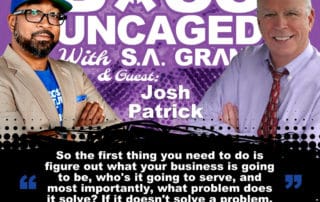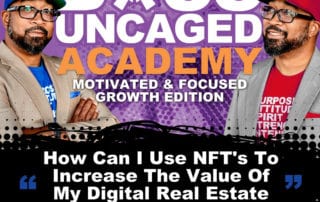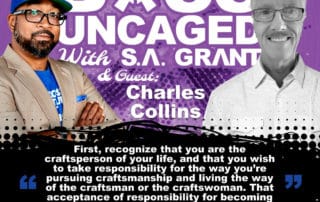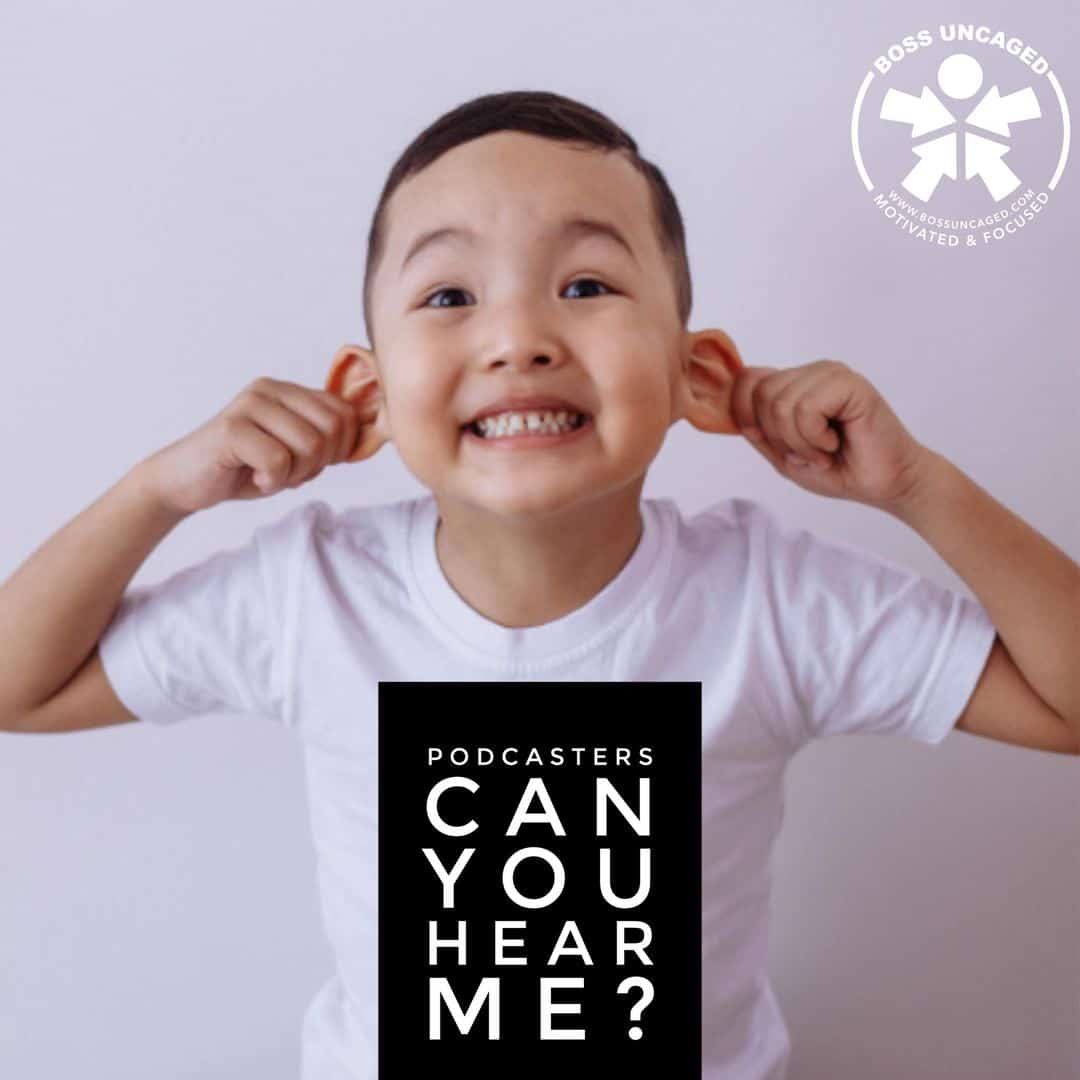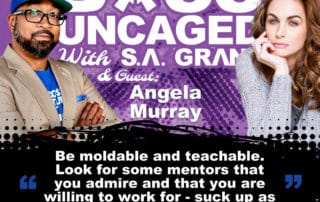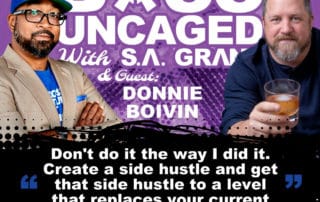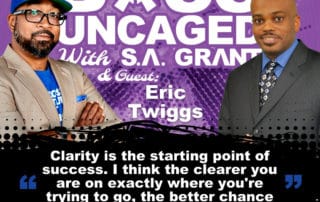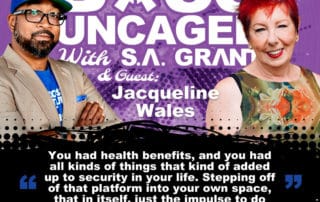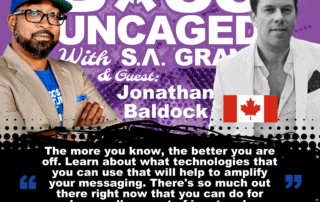Founder Of The Sustainable Business: Josh Patrick AKA The Sustainable Boss – S2E63 (#91)
Boss Uncaged Podcast Overview
Josh’s passion in life is helping private business owners create extraordinary value with their businesses and lives. As a Certified Financial Planner® and a Financial Transitionist®, he knows how to help you get the most value from your business both from personal experience (selling his successful 90-employee business) and from helping countless others do the same.
As a former blogger for the New York Times, Josh shared his tips for preparing for the future in his book, Sustainable: A Fable About Creating a Personally and Economically Sustainable Business. He has taught over 200 seminars and hundreds of companies over the past 35 years.
- How to create a sustainable business
- Great books that Josh is reading
- The beauty of learning by making mistakes
- And So Much More!!!
Boss Uncaged Podcast Transcript
S2E63 Josh Patrick.m4a – powered by Happy Scribe
All right.
Three, two, one. Welcome back to Boss Uncaged podcast on Today’s Show. I’ve deemed this guest the suitable. No. Well, not suitable. Maybe it’s sustainable, boss. Maybe. So let’s kind of get into this a little bit and dive into why am I calling him that particular boss? So, Josh, give our audience a little bit about who you are.
Well, I’ve been hanging around private businesses for a little bit over 40 years. 1st 20 years. I own a food service and vending company sold at when it’s the wealth management business, which morphed into helping private business owners who have blue color private business owners who have successful businesses make them personally and economically sustainable. And there’s four pieces to sustainability that drive it. And four results that come from it.
Obviously the keyword and what you said is the reason why I deemed you the sustainable boss. So if you could pick three words to essentially define yourself, which three to five words would you choose.
Me personally or the business itself? You personally curious, innovative and kind of commodionly like.
Interesting choice of work. So this will dive into your business a little bit. What are the steps in your business that you’re doing to help entrepreneurs?
Well, there’s four areas. We have a full resource area that we go through that helps them look at literally every part of their business in their life, both from a personal and financial point of view. And most folks have something in their business that’s not working the way they wanted to, and we help them figure out in a very simple way what it is that’s not working and then come up with some simple solutions to solve them. But the simple is not easy, which is really important for people to understand. Solutions need to be simple. Implementing solutions takes some work, and if you’re not willing to do the work, you’re probably not going to get the result. But the four areas of sustainability are you values like company. Do you have a recurring revenue stream? Have you made yourself operationally irrelevant in the business, which means you’re not involved in the day to day and have you systematize your business so the business can run without you. And when new people come in, they know what to do in a very rapid manner.
That’s definitely interesting. It seems like you have a hybrid between coaching and at the same time you’re doing consulting and you’re figuring out what their businesses are. Then you’re giving them the opportunity to streamline their processes, streamline their business, to get the most value and the most profit out of their business from where they were moving forward to where you want them to go in that direction. Is that essentially correct?
Yeah, it’s pretty right on the money. And what I tell people is that I’m not a coach, I’m not a mentor, I’m not a consultant. What I am is a thinking partner. I sit next to you, and I help you think through your problems. I help you figure out what it is you want to do. We drill down on why that’s important. We go back and look at the what? Because the first one we started with is usually going to change. And then we go to the really important step, which is who is going to help you. Then we finally get around to how you’re going to do it. But we really almost never get around to how you’re going to do it, because who you’re going to help you is going to determine how you’re going to get to point A to point B. In fact, those people who you bring on board to help you basically should bring experts on who know how to do what you need to have done. Let them do it. And you just stay a at relatively high level, supervising what they’re doing. In other words, that’s part of delegation, which is operational relevance.
Got it. That definitely makes perfect sense. So with this particular system, let’s just think about time, right? How did you even get into this business structure? Like, when did you wake up? Was it one of those things that you knew in high school? Did you figure it out post College? When did you figure out this was going to be part of your journey?
I don’t think I ever did. I think it just sort of happens leads to another step, leads to another step leads to another step. I was the education chairman for the National Vending Association for eight years. So I developed and taught a bunch of boot camps for vending operators. And the basis of what I’m doing right now came out of those classes, and I’ve modified and simplified and made it more applicable for every business owner, but especially people on blue collar businesses where the people in the front line do or make something.
So you’re talking about you went from vending machines and anybody that kind of understands vending machines, they’re kind of like cash cows to a certain extent, right? I mean, you kind of put products in, and if you set it up correctly.
I wish they were cash cow. The industry itself is a really very marginally profitable business. Our best year was 5% for a bottom line. Most of the time is 2%, and most vending companies actually lose money every year. They make money in the cash flow, but they lose money.
You make a solid good point. So just talk about that a little bit. Why would somebody go into that space if they’re only going to be relatively between three to 5%?
Most people get into it by accident, which is how I did it’s a family business. My father had a vending company back when he went to the vending business. It was more like a twelve or 13% bottom line. As time went on, every place that could have vending machines had vending machines. So now you’re starting to compete on pricing Commission. And when you start competing on that, it’s a race to the bottom, which means that nobody was really making any money. But we had a lot of costs, and it was a good cash flow business.
It’s one of those things, I think obviously, you made a positive shift and you took what you learn from that business, and you created a whole newer business based upon those philosophies. So I guess my next question would be, when is a good time for someone to try to make that shift, right? Obviously, you had a business that was at one time you said your dad was at 13%. Now it’s about 3% to five, and you made that shift. If I’m a client coming to you and I’m telling you my same exact numbers that you just stated were your numbers, what would you then tell me to do next?
Get out of your business and find something else to do? It took me years to get there. I mean, it wasn’t like I woke up one day and said, hey, this business stinks. I’m going to have to get out of it. It took me three to five years somewhere in that range to say, hey, this business isn’t working so well to actually have sold the business to somebody else and make it their problem. We have choices. This is really important. If you’re going to start a business from scratch, one of the things you should be doing is looking at the profitability of your industry. If the industry is not profitable, don’t bother. There’s lots of industries. You can go into hundreds of them and many of them if you run them right, can make you a lot of money. Or if you happen to be say, you’re in a construction business and you’re not using any process controls to improve how you do whatever it is you do. I happen to, like, scrum a lot for project based things, which is a software development tool, but it works really well for anything you got a project for. And I might say, hey, if you got a 5% bottom line, you’re running interior contracting company. We’re doing sheet rock and studs and all that kind of stuff. But what if I could come in and show you a system that would take 20% of your labor today, which will take 20% of your labor? Reduce it, and it goes right to your bottom line. So that 5% bottom line you had will now become a 14% or 15% bottom line. Would you be interested in that? Yeah.
Everybody should raise their hands constantly, right?
Yeah. Well, again, they have to do the work. So knowing what you have to do and then getting around to do it are two different things. So one of the things that Peter Drucker used to say is strategy eats tactics for lunch. And what I just talked about is a strategic decision you would make in your business and how you’re running it. And then you have to implement that through tactics. But without the strategy behind what you want to do, you’re never going to get to where you want to go. You want to keep your strategies really simple, really understandable by everybody in your organization, otherwise not going to be used.
So it seems like you’re running a lean model to a certain extent. Kind of like the lean philosophy.
Yeah, it’s a lien philosophy. The philosophy really is W. Edwards Deming, who in the 30s came up with this 14 points used. It was actually in the 20s, came with those 14 points, and it was used by the United States to create the most amazing war machine of all times after World War Two, American industry, for whatever reason, decided they didn’t like them anymore. He was a really cranky old guy. So he went to Japan and Toyota adopted them. And what came out of ten means 14 points became the Toyota production system, which became what we know today as lean manufacturing. But the basis for that goes back to the 14 points of Deming developed in the 30s. It’s really easy to see what they are. Just Google Deming 14 points, and you’ll find out exactly what they are. Put them on your wall, memorize them, use them every day. And that’s a great place to start. For small businesses. Small businesses should not be doing lean. It’s way too complicated. Lean is good for Toyota, it’s good for GM, it’s good for Ford, it’s good for Caterpillar, it’s probably good for craft foods. It’s not good for Joe’s plumbing and heating. Way too complicated. Way too many moving parts. If you want to use what’s modern process improvement stuff, you either want to use Scrump or you want to use the theory of constraints. Both are really good, and there’s lots of information and lots of books on both. Yeah.
I think you brought a good point about, like the 1930s. I think a lot of people don’t realize it’s so much information that came out from the 1930s that we’re still utilizing in some shape form. Prime example would be like Napoleon Hills. His mastermind principles are still being utilized effectively almost 100 years later.
That was more than 100 years ago. That was Carnegie was just what his writing was about.
Yeah, it was definitely was.
So now you’re in the beginning of the 20th century when you’re writing about that. Interesting.
So let’s just go into your business structure. Is it structured as an LLC.
S Corp. Or C Corp. S Corp. You should never have a C Corp as a small private business today. Now, that may change in the future. But my guess is with what’s going to happen with Biden’s tax code, you’re going to want to stay as a passenger through Corporation, which is an S Corporation. And by the way, an LLC is just a corporate thing. You get taxed either as a C Corp. And S Corp. Or sole proprietor or a partnership within your LLC. So an LLC is not a structural form all by itself or is not a tax form by itself. It’s sort of like there’s a new form of incorporation called B Corps benefit corporations that doesn’t change your tax structure on one single bit. You still choose how you’re going to be taxed within that B Corp. Structure. Same thing with an LLC.
Do you have any active partnerships inside of your S Corp? Or is it just you or the sole proprietor of that?
I’m the sole owner, but my wealth management business, we sort of act as a cooperative. I’m the owner, but there’s limited profits within that company, and we just sort of share expenses between the other advisors and myself.
Very nice. So obviously you’re very seasoned in business structure, and you understand a lot of different things on a deeper level than most business owners do. So how long have you been on your journey and anyone that’s listening to this may perceive that you’re overnight success, but in reality, how long did it take you to get to where you are 42 years?
And if you have some time and want me to tell some early stories, I’ll tell you how bad a manager I was when I first started at 23 years old.
Let’s dive into that. What’s the worst experience you had in your early days?
Well, I had lots of bad experiences in early days. The worst thing happened to me that could ever happen to a young business owner. When I first started, I was really, really successful. And you would think that’s a great thing. But when you first started out in business and you’re 23 years old, when I put a million dollars in new business on our books in four months, that was lucky more than it was skillful. But because I was 23 and didn’t have any life experience in running the business, I thought it was because of my great skill. So I went charging off being the worst boss of all times, making every mistake that could possibly be made because I didn’t understand how to read a cash flow statement, which is way more important, your profit and loss statement or your balance sheet, but almost no private business owner knows understands it. I was very profitable, but running out of cash. So the grim Reaper came. The phone started ringing, said, what am I going to get paid? And I said, what do you mean? Well, you’re 90 days overdue. Another phone rang. What am I going to get paid? What do you mean? I’m 120 days overdue. So I had this emergency going on that I never knew existed was I had flat used all the cash I had available. I used all the bank lines I had available. I used all my supplier lines. I had available and I didn’t have enough cash coming in to pay off all the people I owed, which caused I have a problem. I managed to work my way out where I renegotiated and set term loans up with my major suppliers, paid them cod agreed to pay to my back balance over three years. They kept me in business. I didn’t have to go bankrupt, but it still was a pretty stressful time in life, and that was a pretty hard lesson to learn. Another lesson I learned was I was a till with a Hun. When it came to running my business, I had no idea what the values of business was. I didn’t know how important values were in the business and it was my way or the highway. And when things went wrong, I would either scream at somebody, which was my usual thing, and I would blame them for screwing it up, even though they didn’t know what they were supposed to be doing in the first place. Or I would justify why it wasn’t my fault. And it was their fault. And around when I was about 30 years old or actually 29 years old, I went to a new age seminar. And at that seminar, the main thing I learned was if you’re not personally responsible in your life, you’re never going to have real success. So I went back to my business and I said, hey, we’re now going to have personal responsibility as our most core value. Except I wasn’t being responsible at all. I was still blaming and justifying. So I’ve seen by all the people working in my company as a liar, and eventually I got it. And I looked in the mirror and I said, Until I start acting responsibly, nobody else in my company is going to act responsibly. So I learned that if you don’t walk your talk, nobody believes a darn thing that comes out of your mouth. So that’s where I learned the lesson of being a values led company. Now, four or five years later, after I started down that road, we actually became a values like company. I wasn’t just talking about it. And as a result, the whole world changed as the people in our company knew what they were supposed to do. They knew how they were supposed to do because we are systematized at the same time, and it became a much better place to work than with me screaming to people every day. Although I had the reputation of being a screamer for my entire 20 years, I owned that business. I really only screamed for five of those 20 years. When you get a bad reputation, it never leaves you. It stays forever. So you just have to say, okay, that’s part of life. But the truth is, if you’re acting consistently with what comes out of your mouth, you’re going to have a great company, definitely.
Talking about those mistakes. If you can go back and change anything, just change one thing. What’s that one thing that you would change if you could go back and do it all over again.
See the point with people ask that a lot, and I usually say nothing, because without that learning experience, I wouldn’t be where I was today. I am today. As a result, I was an American history major in College. It doesn’t do a lot to get you ready to run the business. My father was an English major in College. He never took any business courses. So he was my role model, and he was a screamer. So I was a screamer. So you have to learn by making mistakes. If you don’t make mistakes, you’re not going to learn now, I can help you avoid mistakes. But if you’re really stuck in a bad behavior pattern, you need to figure out if somehow I can help you understand that by thinking through your challenges that you’re having with you. But I need to help you understand that. And I do that through asking questions. A great leader doesn’t tell. They ask, we all know what we’re supposed to do. I’ve never talked to a business owner at some level. When I ask them a question that they’ve never thought about that before. Everything I’ve said today, anybody who’s a business or listen to this podcast, you have thought about everything I’ve said at some level, or you’ve heard about it at some level. Very true. And the truth is, you need somebody sitting next to you, not coaching you, but helping you think through your actions and making it work in your way. See, coaches want you to do things their way. Mentors want you to do things your way. I want you to do things your way, but use best practices to do it way different way of looking at the world of helping people create more sustainable businesses and ultimately make your business sale ready. And by the way, if you make your business sale ready, it just means your business is in a position somebody else would want to own. It not that you want to sell it. Most of the time when we actually get a business to be sale ready, and I go back to the owner and say, okay, now you’re ready to sell your business? They look at me like I’m crazy, and they say something like this. Why would I ever want to sell my business? Now? I’m having way too much fun and I’m making way too much money. It doesn’t make any sense. I’m not even working very hard.
Makes perfect sense. Obviously, you’re a hell of an entrepreneur, right? And you brought up your dad about a minute ago saying that he was an English study. Do you have any entrepreneurs in your family? Like, where is your entrepreneurial? Hustle and Tenacity coming from?
My father is an entrepreneur. He started a zillion business. He had a couple that were quite successful, but he would start to buy businesses all the time. Most of them were really dumb, but he did it. His father was an entrepreneur. He was an immigrant from Russia, so newspapers on the corners. When he was seven years old, when he first got to the United States, ended up only a Slipper factory during World War two, sold out, retired when he was 45 years old. On my mother’s side, her family were peddlers. They went into the woman’s retail clothing business. So both sides of my business, my family, our strong history of being private business owners.
I think you could definitely tell there’s some people that kind of grow into entrepreneurship, and there’s some people that I would say kind of like yourself. You were kind of born into it like you’ve seen it your entire life. And obviously it kind of shows. I mean, you’re definitely well seasoned in verse in entrepreneurship 100%. So let’s just dive into your family life a little bit. How do you currently juggle your work life with your family life?
Well, I don’t believe in work life balance. I think that’s a myth. I think it’s work life integration. You integrate your work into your life and you integrate your life into your work. Sometimes you’re working 80 hours a week and sometimes you’re working 5 hours a week for me, my kids are gone and grown. I have two puppies and a very nice wife, and we’ll ski a lot during the wintertime. I ride my bike a lot during the summertime. I’m a live music freak. I go to live music stuff as much as I possibly can. Unfortunately, the last year signed knocked that off. I play around to playing the bass. I’m not very good at it, but I enjoy it. So it’s not like all I do is work, work, work. And I’ve been reading almost a book a week since 1976, when I graduated from College. Wow.
It’s funny that you brought that up about reading a book a week, because recently I started a book club, and that was like one of the first things that I established right away in the first week was how to be able to read a book per week because the average CEO reads about 60 books per year to just kind of get that group of people to understand it. Reading a book per week is not as hard as you may think it is.
All you need to do is find 45 minutes a day to read or even a half an hour a day to read. And you’re going to read the average book in three and a half 4 hours. You got to find three and a half 4 hours to do that. The other thing you can do is learn how to read faster. I don’t read one word at a time. I read two lines at a time, so I just scanned down the page. So I read about 75, 80 pages an hour as a rule, so I can read a 200 page book in a couple of two and a half 3 hours. The other thing you need to do is turn off your TV and read. I mean, if you actually sit down, there’s a good exercise to do. And I have all my clients do this for two weeks on a yellow pad every 15 minutes. Write down what you’re doing, and at the end of two weeks, you go back and look at that. You’re going to find at least half the time you spend doing things a other people could do it better and be much of that stuff you shouldn’t be doing in the first place because it’s just a time waster and adds no value to your life.
Yeah, you’re definitely right about that. So this is going to like your morning routines, your morning habits.
I always get to ask this question. Excuse me, but it’s just for me, it’s a dumb question because I don’t have a morning routine. I get up, I take the dogs out, I make coffee and I wander around playing with the dogs and go outside. If it’s nice. And I happen to like Morning Joe, which is showing MSNBC. I watched that for half an hour and I go downstairs and start doing whatever it is I want to do for that day. I’ll do a Journal entry a few times a week, but it’s not something I do. I don’t have something to do. This is what I do every day to get ready for the day again. If you are somebody who’s highly systematized in how they live their life, that sort of routine works really well for you. I’m not. There’s an index called the Colby Index, which measures energy units around different areas. Somebody who has that high morning routine sort of thing would be a high follow through. In other words, they have a lot of energy for doing things in a systematic way. I have no energy to do things in a systematic way. I just use systems to keep me from going chasing my favorite bright, shiny object to the second because my attention gets scattered really fast and I’m writing a book. The first thing I do is I write for an hour for 2002, 500 words. When I’m done with that, then I do everything else in my day because that takes some real deep focus. Or if I’m doing, like, over the weekend, I did seven videos. So for the first day, I sat down for 3 hours and I wrote seven video scripts, and then the next day I sat down first thing in the morning and I shot seven video scripts. So that was the one thing I really wanted to accomplish that day. And I did that first thing in the morning. That’s about as much of a morning routine as I have.
Yeah, I think for you, it’s just so ingrained in you to do what you do. But the reason for asking that question is probably somebody listening to this podcast that may be much like you, and you just kind of outline and define things even when you went into talking about your scripting, right? That’s not something you do every single day. But what you pretty much said is that you get into deep work, you set time aside and you make sure you do these particular things every single morning so you can get the best results every single day. And that’s like the major takeaway for someone listening to this to understand like that’s your morning routine, and they could relate to it.
Well, essentially, what that comes from is a concept that Steven Covey had years and years ago called Big Rocks, and you should always have two or three big rocks in your life, which are major projects you’re working on. And those are the things that you do first thing in the morning. Now I will tell you, I don’t do deep work every day. There are days where I just screw around for the whole day. I mean to do something useful, but I end up doing nothing, and I don’t beat myself up about it unless it happens for three or four or five days in a row. And then I kind of have to have a conversation with myself and say, Is this what you really want to be doing? Is this how you want to live your life? And the answer will usually be no. And then I have to get some discipline in place to actually just go and do the stuff. Now, discipline is a really important skill to bring to the party. If you don’t have it, you’re not going to be successful.
I think we went over several different topics and we alluded to the book club a little bit. So this is the time I’m going to ask you a three part question, and it’s about the books that you’re reading, right? I want to know what books that you can recall that you would want to recommend from your past that helped you to get to where you are. What books are you currently reading right now? And have you written any books?
I have written two books. This is my second book, which I just got copies of. If you can’t see this because you’re listening to the podcast, it’s the sale ready company what it takes to create a business someone who don’t want to own, even if you have no intention of selling. It’s a parable. And my first book is sustainable, a favorable creating a personally and economically sustainable business. And that’s also a parable in the second book is actually a continuation of the first story. I find that parables are much easier to consume for business owners because they like stories. And how two books my sister, when she read my first book, said, you know something? This is the first business book I’ve ever finished because I wanted to find out what happened. So one of my favorite authors is a guy named Patrick Glencioni, who is the Parable King. The guy has written 1012 parables and they’re really good. And also my favorite business books by him is a book called The Advantage, which is only how to book. And in there he talks about values and how to use values in your company. And he puts values in the Four Buckets, which is really interesting. Seven Habits of Highly Effective People is a book that everybody should be reading. Management by Peter Drucker is a book that everybody should be reading. If you’re interested in sales, the Challenger Sales, the best sales book I’ve ever read. If you’re interested in how to create content, that’s really good for you. You want to read Story Brand by Donald Miller and integrate that stuff because this stuff is just amazing. In fact, we just launched our second Story Brand site this morning, so if you want to check it out, go to www. Dot sustainablebusiness Co. And you’ll see an example of what a Story Brand site looks like for marketing. My favorite book of all times is Book Yourself Solid, the illustrated version by Michael Port. That way you can go through all the exercises in the book. And at the end of the day, you’ll have developed a really good niche and avatar of who your best customer is and you’ll know how to stay in contact with them. Give me a topic and I’ll tell you the book. As far as Scrum goes, you want to read Scrum by Jeff Sutherland. He’s the inventor of scrum. If you want to read about the theory of constraints, you want to read the goal, which is again, another parable, which is a really good example of how to use the theory constraints, which is just whack them all for business. In other words, you find a bottle of neck, you fix it and you wait for the next bottle of neck to appear. I’ve probably read 1500 business books over the years and both of my books I have I think about 120 books I put in the bibliography that you should read.
I think that kind of opens up Pandora’s Box to a certain extent. Obviously, my question for you is listening to you recite these books, right? Like most people, they would have to say, I’ve heard before. Oh, I don’t remember or I remember the title of the book. I don’t remember the author, but for you, you were distinctly stating book titles and authors. So my question is, do you have a photographic memory or have you practiced the art of memory to get to the point to where you’re just reciting these things off the top of your head like that?
I have no memory. I cannot remember anybody’s name. I embarrass myself all the time. With that. It happens to be I’ve talked about these books enough where they’re ingrained. And when I do a public talk, when I’m on the stage and I’m doing a keynote presentation, I’ll usually mention 15 to 25 books during my presentation. The reason is I’m a real believer that if you really want to be good at what you’re doing, read The Masters. I’m a big fan of Stoicism and Stoicism fits really well with my core value, which is personal responsibility. And it sort of talks about how do you get to where you want to be in the most effective manner? And the thoughts and things have been written by people who have come before me or people. All these people are way smarter than I am. So I get to steal their best thoughts and integrate it into my life. And I talk about these books all the time for the people I work with.
Got it. So I mean repetition, repetition, repetition.
Yeah.
So where do you see yourself and your company, right? I mean, obviously they’re two different things, but they’re working together in unisons. Where do you see both the alliance in 20 years from now?
I’m 68 years old, so I can promise you 20 years from now, I’m not likely going to be doing my business. My personal mission in life is to do interesting things with interesting people. So that’s how I sort of measure everything I do today. If it’s not interesting to do. And I’m not doing it with people who excite me, I have no interest in doing it. I, luckily have saved probably enough money for retirement. I’m working for enjoyment more than I am. Of course I want to make a living. But it really for me is if it’s not fun, why do it? And actually, if you want to know the truth, if it was not fun, why do it? It should be your mantra when you’re 30 years old as well as 68 years old.
Yeah, definitely some inspiring information. So what are some tools? Like you said earlier, you were talking about scrum. What are the software are you currently using that you wouldn’t be able to do what you do without?
Well, I could do everything I do with a paper and pencil if I had to. The truth was, when we put our first computer and was 19 and 78, it was a computer was as big as a washing machine. It was made by Digital Equipment Corporation. It had 256 KB of memory, not megabits kilobits. It had 20 megabytes of hard drives, and the hard drive container was as big as a washing machine. And it took about 80 hours to run a profitability statement. It would now take about three minutes if that.
Did that run off of punch cards or what kind of.
No, this was key punch. Okay. Yeah. This was after punch cards. Punch cards were the early 70s, early 70s. We actually had terminals for inputting.
Got it.
And so all the computer does, and the software does. It takes what you could do with a pen, paper and pencil does it faster and more intensely. Obviously, Excel. Everybody works with Excel. My favorite project management tool is a program called Monday, which I could I live without if I had to. But, boy, it would make life a whole lot more difficult than it is. I use Base Camp for some really basic interactions with people. I don’t use Slack because I hate it. There’s a new program out, which is called Mighty Networks, which we’re putting together for communities, which we like a lot we use ClickFunnels mostly for landing pages, and I use HubSpot for my website in integrated marketing. Right. And there’s a bunch of other programs we use that are specific for the wealth management world.
So let’s go into the final words of wisdom. Right? To your point. You’re saying 30 years old, you would say things a little bit differently, right? What words of insight would you give to a 30 year old coming up in this particular space and you want to not advise them or coach them, but you want to point them in the right direction?
Well, I would ask them some questions. First of all, what is it they’re interested in? What is their passion? Are they following their passion? And if their passion doesn’t appear to make any money at it, how could you figure out to make money at it? It’s really interesting if you talk to I went to Brendan Buchard seven hour coffee a few years ago, and it was called Experts Academy. So it was about teaching you how to take your expertise and make it into a business. About halfway through the seminar, asked how many people here have a business or an expertise they want to share with the world. Now, there are about 5000 people in the room. If 100 hands went up, that would have been a lot. I was sitting there saying to myself, My God, you guys are all trying to do a business and you have no idea what your business needs to be. So the first thing you need to do is figure out what your business is going to be, who’s it going to serve. And most importantly, what problem does it solve? If it doesn’t solve a problem, you have a crappy idea for a business.
Definitely solid information. I mean, I’m just stopping and I’m recapping what you just said in my head, and it really comes down to any solution that anyone is creating, any coaching, any mentoring, any online course at the end of the day, if it’s not solving a problem or it’s not the solution to a particular problem than why you can create it. So it’s definitely insightful. Words, wisdom?
Yeah. One of my sort of more obnoxious habits I have is I look at other people’s websites, and it’s amazing how few people ever talk about the problems they solve on their website. They talk about the stuff they do, but nobody really cares about the stuff they do. You do. They care about the problems you solve. My example, if I buy a car, I don’t really care if there’s 400, 500 or 1000 HP under the hood. What I really care is there’s a Hill which is outside the town I lived on? Will my car in cruise control go up that Hill at 70 miles an hour and not lose speed? If it does, that car has all the power I need. I don’t care about torque or power or any of those stuff because it doesn’t mean anything to me. And is the car big enough for me to fit in? Because I’m 65? Those are really the only comfortable. Those are the things I want to know. Those are the problems I need solved. I don’t care how many inches of space there is. It’s just can I fit in it and put my legs out straight? So when you’re running a business, if you’re not thinking about the problems that you solve for your customers, you’re missing the point with your customers.
Well set. Definitely. Well set. So how can people find you? I mean, like, what’s your website, your social media profiles.
I have two websites. One is www. Stage twoplanning. Com. That’s with the number two, and my other one is www. Dot. Sustainablebusiness co that’s cot. Com. Those are the easiest places to find me both have contact me if you want to send me an email. My email address is jpatrick@stagetwoplanning.com. Social profile on Twitter is ask.JosPatrick and on Facebook look for the sustainable business. You’ll find our business page and I don’t do Instagram, so I can’t tell anything about that. I’m too old for Instagram. I’m old by my daughter.
That’s just the way the kids try to keep the adults off of their particular platform. That’s just the way they look at it.
She’s 36, so I don’t think really care.
So let’s go to some bonus questions. Right. And I think because you’re a historian and you studied history, this is probably going to be a pretty interesting answer coming from you. If you could spend 24 hours with anyone dead or alive uninterrupted for those 24 hours, who would it be and why?
Oh, boy, that’s a hard one. That’s a hard one to answer for me, because there’s a zillion. Probably buck. Mr. Fuller. Buck. Mr. Fuller is a guy from the 20. He was alive in the 20th century, invented the geodesic Dome, was a mathematician, probably one of the most interesting philosophical thinkers in the world. He had a very interesting thing about mistakes. He used to say it said two things said one, you don’t learn less. And two mistakes are learning opportunities. And those were the two statements that sort of made a light bulb go off my head to say I might be doing this wrong the way I’m running my business because I used to punish people who made mistakes and never really thought about mistakes being learning opportunities. I was the only one who could make mistakes, not other people in my business. When I learned that other people could make mistakes, it turned everything around for us.
Well, interesting. Another bonus question for you outside of your family, outside of your kids. What’s your greatest achievement today?
Making it through cancer? Very serious about a cancer about twelve years ago. It took me about four or five years ago through it.
What kind of cancer was it not?
Hoskins lymphoma, the subsidized methyl cell, which is a very nasty used to be very deadly type of lymphoma. Wow. Yeah.
I definitely commend you. I mean, I had suffered from a stroke two years ago, so just the road to recovery is one of those things. I look at you as one of the survivors and one of the people that kind of figured out that life doesn’t have to end when you’re confronted with death and there’s always more opportunities after that.
Yeah. There’s some really interesting stuff going on with mushrooms and people using them to stop fearing death. I’ve been doing a lot of research into that. Again. I’ve seen 100 Grateful Day concerts, so you can take with what that means. I have found that micro dosing or using Hallucinogenics for facing really difficult life things, getting some really interesting research done on it right now.
It’s pretty interesting. I mean, I definitely look into that. So going into closing, I mean, I always have the opportunity to interview people like yourself. And I always love the insights. And I love the words of wisdom on this journey on this podcast. Any questions that may have come up that you would like to ask me?
Yeah. What do you think is the most interesting things we’ve talked about today.
Collective? I think I could definitely for me, it’s the overall conversation, and I can definitely see you utilizing your history background like you’re pinpointing particular things, your dates even earlier, when you were correcting me about the 30s versus the it’s like you understand the history of what has happened and you’re using it in today’s world. You understand back then and you’re converting it into now. And I think that’s my general takeaway that I love and embracing from what you said today. Cool.
The thing about history, which is really interesting in high school, your history classes. What, in other words, what dates did something happen? That when you go to College, history no longer deals with dates. It’s all about why, why did this event happen? And that’s the most interesting thing about business. Also, why is the business successful? Why is the business not successful? Why is one person in the same industry far more successful than the exact same industry? So if you focus on wise, life becomes a lot more interesting at least for me.
Yeah. And I think that goes back into your other statement about if you’re not solving a problem right, then why are you doing it to begin with? And that’s like the conclusion of everything is you have to essentially apply whatever you’re doing, that’s your value add to solve someone else’s problem or educate them on how to solve their own problems.
Yeah. Absolutely. Definitely.
Well, I definitely appreciate your time, Josh. It was definitely an enlightening episode. Another one of these episodes. I’ve had one of these. Maybe in the last week. That’s just kind of like I wish I wasn’t interviewing you. I wish sitting there taking notes, so it’s going to be one of the episodes. I’m going to go back and review over and over again, but it was definitely a pleasure having you on the show.
Thanks so much. It was really fun doing this. I appreciate it.
Great S.A Grant over and out. Bye.

